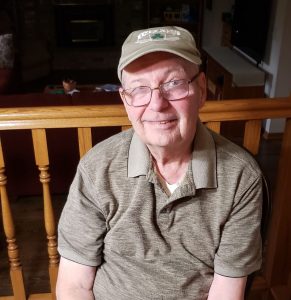Wayne Quehl
My 71-year-old husband, Wayne, was diagnosed with Glioblastoma in December of 2021 after having a seizure while driving. He drove the car into the edge of the garage and was dumbfounded that he couldn’t see it. After this incident, we learned that the peripheral vision on his left side was gone due to the location of the tumors on his right parietal side.
Subsequent biopsy confirmed our worst fears. We elected not to do resection surgery based upon the surgeon’s advice to “just enjoy the time you have left.” We sensed that in the long run, it would not add quality time to his life. After six weeks of radiation and temozolomide the tumor quickly grew, so, he started infusions of Avastin twice monthly, chemo 5 days a month, and started wearing the Optune device: arrays of electrical probes on his shaved head that, along with a hefty battery pack, always keeps him company. I think of this device as the “iron lung” of brain cancer treatment. Changing the arrays twice weekly, smelling the fumes that emanate from the four arrays, and hearing the beeps that tell you to fix something, can be overwhelming at times. I have hope that somebody, somewhere in the world can come up with something a little less intrusive! But all in all, maybe these life altering additions have delayed the tumors' ability to devour even more of our normal life.
Right now, fatigue is constantly present, along with, of course, the cognitive challenges, social withdrawal, and the constant fear of seizures that occur about once a month, despite anti-epileptic medicines consumed multiple times a day. The seizures are usually hour-long events, with extreme cognitive dysfunction, “flashing lights”, and loss of left side motor control. I give him emergency Ativan: the drug a hospital would give him anyway, and it gradually gets better, but we never know how much of “him” will return.
We have learned that the emergency room cannot help with brain cancer symptoms: they just rule out stroke or heart attack and, after many stressful hours, send us away wishing we had “toughed” it out at home. On a positive note, our medical care has been good, our insurance is adequate, there are knowledgeable staff at the brain cancer clinic in Minneapolis that will quickly return calls and take time to talk me away from the cliff. We are grateful for these things. Sympathetic neighbors who clear my snow clogged driveway, prayerful church friends, and present adult children complete the support picture.
But, no matter how helpful people wish to be, there is nothing that I have experienced that can compete with the fears of a brain tumor. So, we live day to day, trying to replace fear with trust and doubt with confidence. My love of 48 years is a trooper!

